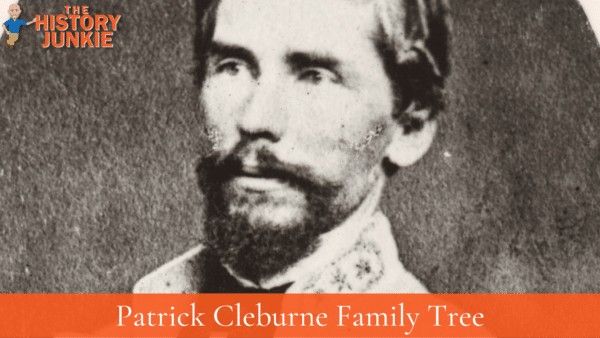Patrick Cleburne was a famous Irish-born Confederate general in the Civil War. He was one of the most skilled and successful generals in the Confederate army, and he was known for his aggressive tactics and his devotion to his men.

Cleburne was born in County Cork, Ireland, in 1828. He immigrated to the United States with his family in 1849 and settled in Helena, Arkansas.
He became a successful lawyer and businessman, and he was elected to the Arkansas House of Representatives in 1858.
Jump to:
When the Civil War began in 1861, Cleburne volunteered for service in the Confederate army. He was commissioned a colonel and was given command of the 15th Arkansas Infantry Regiment.
Cleburne quickly proved to be a capable and effective leader, and he was promoted to brigadier general in 1862.
Cleburne served in many of the major battles of the Western Theater, including Shiloh, Perryville, Stones River, Chickamauga, and Missionary Ridge.
He was known for his aggressive tactics and his willingness to take risks. He was also a skilled tactician and strategist, and he was often called upon to plan and execute complex offensive operations.
Cleburne was a popular figure among his men, and he was known for his concern for their welfare. He was also a devout Christian, and he often led his men in prayer before battle.
Cleburne was killed in action at the Battle of Franklin on November 30, 1864. He was one of the highest-ranking Confederate generals killed in the war.
Cleburne was a brilliant and capable general who made significant contributions to the Confederate war effort. He was a skilled tactician and strategist, and he was a popular and respected figure among his men.
Cleburne's death was a major loss for the Confederate army, and it is difficult to say how the war might have turned out if he had lived.
Family Overview
Patrick Cleburne became a well-known Confederate General of the Civil War. He was originally from Ireland, where his father was a doctor, and his mother had another three children.
He came from a line of Irish royalty but migrated to America to seek opportunity out west.
The same is true for the rest of his siblings and stepmother who came to America.
Most of his half-siblings migrated and stayed in Kentucky, while the first group of Cleburne's migrated to Kentucky but eventually moved further west into Nebraska.
Patrick never married and never had any children. His death during the Civil War cemented that he would not have an heir.
Family Tree Chart
Parents:
Joseph Cleburne (1792 - 1843) - He became a doctor and was from a wealthy Irish background. He was born and died in Ireland. He and his first and second wife had many children.
Mary Ann Ronayne (1793 - 1829) - She married Joseph and would be the mother of Patrick along with 3 other children. She died, and her husband would remarry.
Spouse: None
Children: None
Siblings:
William Henry Cleburne (1824 - 1910) - He migrated over to the United States, and unlike his brother Patrick, he did not take up arms in the Civil War. He married but did not have any children. He died in Kentucky but is buried in Nebraska.
Annie Cleburne (1826 - 1910) - She migrated to the United States and lived in Cincinnati, Ohio for a short time. She met her husband and had three children. She died and is buried in Omaha, Nebraska.
Joseph Cleburne Jr. (1829 - 1893) - He was born in Ireland and migrated to the United States like his other siblings. He married and had children. He is also buried in Omaha, Nebraska.
Isabella Cleburne (1831 - 1916) - She was born to Joseph's second wife and would eventually migrate to the United States and would not get married. She would die in Kentucky in her late 80s.
Edward Warren Cleburne (1833 - 1852-53) - He died off the coast of South Africa of yellow fever and was buried at sea.
Robert Stuart Cleburne (1837 - 1905) - He migrated to the United States and lived in Kentucky. He was an engineer who married twice and had one daughter.
Christopher Stuart Cleburne (1843 - 1864) - During the battle of Cloyd's Mountain, Captain Christopher S. Cleburne requested that if he were to perish, he wanted to be buried where he fell. He is buried in a memorial wayside named after him. He did not have a wife or any children.
